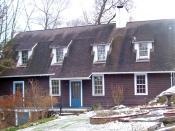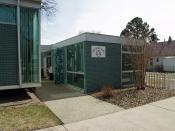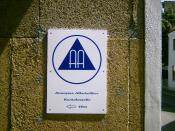Alcoholics Anonymous (AA) was founded in 1935 by a stockbroker named Bill,
and a surgeon Dr. Bob who were both hopeless alcoholics. The two had
initially both belonged to the Oxford Group, a nonalcoholic fellowship
headed by an Episcopal clergyman, Dr. Samuel Shoemaker. Dr. Shoemaker
and an old friend Ebby together helped Bill to get sober. Bill was also
helped by working with other alcoholics. Dr. Bob however did not have
the same initial success, but when he finally met Bill, he told him what
he had learned from Dr. Silkworth; that alcoholism was a malady of mind,
emotions and body (Alcoholics Anonymous). Dr. Bob responded well to
these ides introduced by Bill, he soon got sober, and never drank again.
The two men began work with other alcoholics at the City Hospital in Akron,
Ohio, and one patient became sober right away. Together these men made up the
first group of A.A.,
and shortly thereafter groups formed in several different
locations.
Early in 1939, the Fellowship published its basic textbook, Alcoholics
Anonymous. The text, written by Bill, explained A.A.'s philosophy and methods,
the core of which was the now well-known Twelve Steps of recovery. The book was
also reinforced by case histories of some thirty recovered members. From this
point, A.A.'s development was rapid (Alcoholics Anonymous).
The heart of Alcoholics Anonymous is in The Twelve Steps, which is a program of
personal recovery. New members do not have to accept or follow them as a whole
until they are ready and willing. It takes time for an individual to come to
terms with their problem, and that by going to meetings and listening to A.A.
members they too may begin to heal. The one prerequisite for new members is
that they must stop drinking. Only then, can a new...



Informative
The essay gives so much detail and was written pretty well. It would be easier to read if it weren't double spaced, but otherwise, really great.
2 out of 2 people found this comment useful.